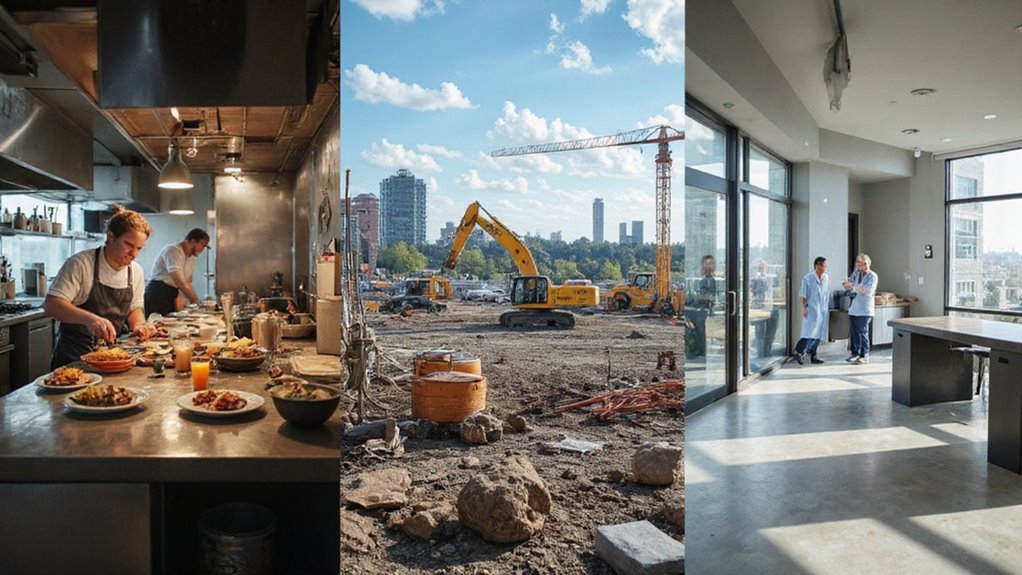If you’re running a restaurant, construction business, or healthcare practice, finding the right term loan can feel like a puzzle. Restaurants can tap SBA 7(a) loans with low down payments and flexible terms, while construction loans often need collateral like land or equipment and come with fixed interest rates for steady budgeting. Healthcare providers get specialized loans with competitive rates and flexible payments for essential equipment. Want to know how to match loans perfectly to your business needs? Keep going, and you’ll get the hang of this quickly.
Key Takeaways
- SBA 7(a) loans with flexible terms and lower down payments suit restaurants needing working capital and equipment financing.
- Construction term loans offer fixed interest rates, staged disbursements, and require collateral like land or equipment for better rates.
- Healthcare loans provide competitive, customized rates with flexible payment plans for medical equipment and working capital needs.
- Restaurants and healthcare loans typically require credit scores between 620-700, while construction financing prefers scores above 680.
- Matching loan type and term length to industry-specific cash flow and project timelines ensures reliable repayment and growth support.
Top Loan Options for Restaurant Businesses

When you’re running a restaurant, finding the right loan can feel a bit like picking the perfect dish from a huge menu—overwhelming but crucial for your success. The best term loans for restaurants, like SBA 7(a) Loans, offer flexibility with terms up to 10 years for working capital or equipment, often with friendlier credit score requirements. But don’t overlook how significant your business plan and financials are; they’re your secret sauce to securing approval. Many SBA loans also provide lower down payments compared to conventional loans, easing the initial financial burden. Equipment loans help upgrade kitchens, while working capital loans keep daily operations sizzling smoothly. Collateral, such as your restaurant assets, can sweeten the deal and enhance your chances. Accessing funds through equipment financing can also provide tax benefits that help optimize your financial strategy. Adopt restaurant financing options that fit your style—not just for survival, but for growth and innovation in this competitive industry.
Key Features of Construction Business Loans
When you’re looking for construction business loans, this helps knowing the different types available and how collateral plays into your terms. You’ll often need to offer assets like land or equipment for securing better rates—and yes, that might feel like a grown-up version of trading your lunch money for something bigger. Funds from these loans are typically disbursed in draws rather than lump sums, which helps you manage expenses as the project progresses. Lenders at Swift Solutions specialize in providing quick real estate financing options tailored to the unique needs of construction businesses. Understanding these key features upfront will save you headaches and put you in control regarding building your business the smart way.
Loan Types Overview
Although construction loans might seem like a single, straightforward product, they actually come in several varieties designed to suit your project’s unique needs and timeline. You can find term loans for construction that cover everything from land development to full commercial builds, often with staged disbursements tied to project milestones—a smart way to keep funds aligned. These options help manage complex project phases by providing tailored repayment schedules. Beyond construction financing, business term loans in healthcare and restaurants also offer customized solutions, with fixed interest rates enhancing budgeting predictability. Whether you’re eyeing unsecured business loans or industry-specific financing, charting the loan approval process can feel like jumping through hoops. But securing the right term loan, whether for healthcare financing or a major build, positions you to innovate boldly and grow with confidence.
Collateral and Terms
Securing a construction business loan means understanding the fine print about collateral and loan terms, which can feel more like a puzzle than a simple handshake. Construction loans often require substantial collateral—think land, buildings, or pricey machinery—to back secured business loans. Your lender will dig profound into financial documentation, checking your credit score and reviewing cash flow to size up risk. It’s important to maintain a minimum business credit score target of 75 on the Dun & Bradstreet PAYDEX scale to improve your loan eligibility and terms. Favorable loan terms usually include fixed interest rates and repayment periods that match your project’s timeline.
Here’s what to focus upon:
- Collateral requirements: real estate and equipment top the list.
- Loan terms: aim for flexible repayment periods and transparent fees.
- Lender reputation: a trusted lender means smoother negotiations and future chances.
With the right approach, you turn complexity into your competitive edge.
Financing Solutions Tailored for Healthcare Providers
Since healthcare costs can feel like a never-ending game in financial Tetris, you’ll want financing solutions that actually suit your practice’s needs—without causing headaches. When healthcare practices apply for funding, it’s wise to partner with specialized financing companies offering medical equipment financing solutions and quick funding. These partners provide flexible provider-managed payment plans alongside no-interest and low-interest payment arrangements, accommodating various credit scores. To improve patient access and reduce provider risk, many financing options now include non-recourse financing which shifts the burden of unpaid bills to third-party companies. You’ll appreciate competitive interest rates customized for your cash flow, making upgrading equipment or expanding services smoother. Additionally, financing now often aligns with emerging value-based payment models, helping you manage shifting revenue cycles. Many healthcare providers also qualify for microloan programs, which offer small loans to help with working capital, inventory, and equipment needs. So, whether updating tech or managing patient care costs, these innovative financing options put you ahead while keeping your financial puzzle components snug and stress-free.
Understanding SBA Loans Across Industries
When you hear “SBA loan,” you might think this is just another government formality that’s tough to navigate—but this is actually one of the smartest financing tools available for small businesses in restaurants, construction, and healthcare. SBA loans offer customized financing with competitive interest rates and manageable term loans, helping you invest in growth while repaying principal and interest smoothly. Understanding eligibility criteria is key: to qualify, your business must be U.S.-based, for-profit, and meet size standards. Ready to plunge? Here’s what you need to know:
- SBA 7(a) loans power everything from restaurant renovations to construction machinery and healthcare tech upgrades.
- SBA financing reduces lender risk, releasing better loan terms—even for innovative startups.
- You’ll want to match your funding needs with the right SBA loan type to avoid surprises.
SBA loans are your backstage pass to business growth across industries. It’s important to note that credit availability for small businesses has been tighter recently, making SBA loans an even more valuable tool for accessing financing.
Comparing Interest Rates and Terms by Loan Type

You’re probably wondering how interest rates and loan terms stack up across restaurants, construction, and healthcare loans—and what credit scores you’ll need in order to get a foot in the door. Each loan type has its quirks: some offer longer terms with lower rates if your credit’s solid, while others might charge more but loosen up those credit score rules. Knowing these differences helps you pick a loan that won’t turn your budget into a puzzle you can’t solve. For specific financing needs, it’s helpful to review the top term loans available for common borrowing amounts like $50K, $100K, and $250K.
Interest Rate Ranges
Navigating through interest rates can feel like decoding a secret menu—each option has its quirks, and picking the right one for your business is crucial. Whether you’re in restaurants, construction, or healthcare, understanding term loans and SBA loans means paying close regard to the APRs your lender offers. Here’s the scoop:
- Restaurant loans typically range from a cozy 6.6% to a wild 75% APR, depending on whether you choose traditional or online financing options.
- Construction loan rates can climb anywhere from 7% to 15% APR, reflecting the higher risks inherent in projects and equipment costs.
- Healthcare term loans usually sit between 6.6% and 15.5% APR, offering stability for upgrading critical medical gear.
Make sure you compare these interest rates closely—that secret menu only rewards the savvy diner.
Loan Term Lengths
Selecting the right loan term length can feel a bit like choosing pants—too short, and you’re uncomfortable with tight monthly payments; too long, and you might end up paying extra in interest or feeling stuck with debt that drags along forever. When you’re eyeing SBA loans for restaurants, expect long-term financing with repayment terms stretching from 7 through 25 years, perfect for big expansions. Construction loans, though, are short-term loans, usually 6 through 24 months, designed to cover project timelines before refinancing kicks in. Healthcare loan term lengths sit somewhere in between, often 5 through 10 years for operations but shorter for equipment loans. Equipment loans across industries tend to align with the asset’s lifespan—think 1 through 7 years. Flexible repayment matters here, so pick the loan term that actually fits your cash flow, not the other way around.
Credit Score Requirements
While a good credit score doesn’t guarantee loan approval, this certainly unlocks opportunities for better deals and smoother sailing when applying for term loans in restaurants, construction, and healthcare. Your credit score influences the interest rates and terms you’ll encounter across restaurant loans, construction loans, and healthcare loans. Here’s the lowdown:
- Restaurant and healthcare loans usually require scores between 620-700, but SBA loans for restaurants are more flexible if you’ve got solid financials.
- Construction companies seek financing with higher credit scores—typically 680 or above—to snag the best rates and terms.
- Small businesses compare interest rates closely; even a 20-point increase in your credit score can save you a chunk of change.
Understanding credit score requirements can seriously impact how one qualifies for a small business loan and future-proof your financing options.
Credit and Collateral Requirements for Business Loans
Steering credit and collateral requirements for business loans can feel a bit like a high-stakes game—you want to win without losing too much in the board. To lock in the best terms, you’ll need to meet credit score minimums, often around 620, with 680+ giving you a leg up. Collateral types vary from restaurant kitchen gear to construction machinery or healthcare equipment, depending upon your industry-specific credit considerations. Loan amount thresholds matter, too: smaller loans might skip collateral but come with higher interest rate types, while larger sums typically require something solid, like real estate. Whether you’re trying to help restaurants secure term loans, grab a construction business loan, or investigate healthcare financing options, your creditworthiness shapes both your options and costs. Play smart, and the deal is yours to win. Lenders typically require comprehensive documentation during the loan application process to assess your qualifications thoroughly.
Strategies for Selecting the Right Loan Product
You’ve gotten a good grip regarding credit and collateral basics, which sets you up for making smarter borrowing choices. When exploring commercial lending, picking the right loan product is key. Here’s how to innovate your financing options:
- Match your loan amount precisely to your business needs—overborrowing can scare lenders, underborrowing might slow growth.
- Gauge your cash flow and debt service coverage ratio carefully; lenders want to see you can repay reliably without sweat.
- Factor in industry specifics—restaurants, construction, and healthcare each demand flexible terms that reflect their unique cash flow patterns and risks.
You’re not just borrowing; you’re creating a financial tool customized to fuel your growth. Keep it flexible, reliable, and perfectly aligned with your business to get the smartest loan deal possible. Franchise owners, in particular, can benefit from choosing term loans tailored specifically to their business model for optimal financing outcomes.






